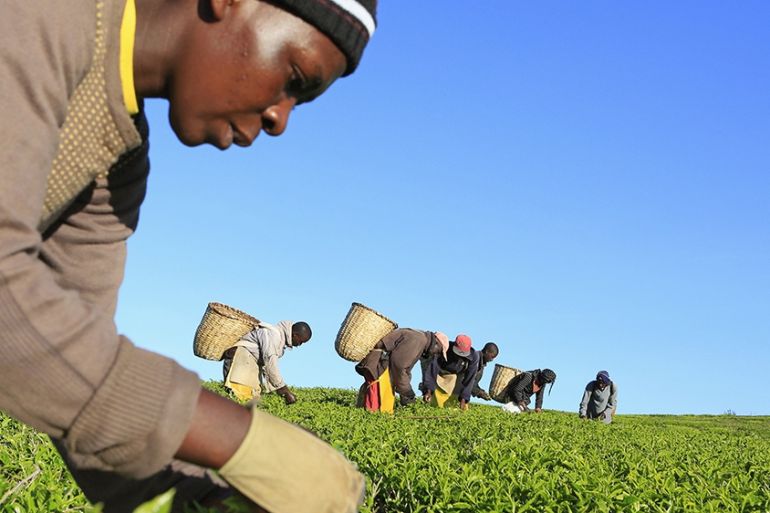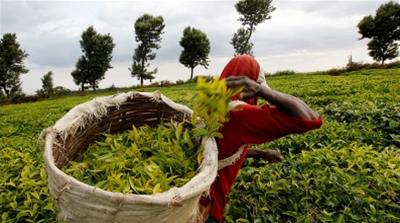Kenya’s agritech startups aim to bridge food deficit
A handful of home-grown agritech startups are working to help Kenya’s farmers grow more crops.

Nairobi, Kenya – When Samuel Munguti graduated from university in 2016 with a master’s degree in marketing, he decided his passion lay in farming. So he took his $4,000 in savings – more money than the average Kenyan earns in a year – rented some farmland in Simba village, Makueni county, and set out to join the estimated 40 percent of his fellow countrymen who earn their living in agriculture.
But as Munguti soon learned, that living can be unpredictable.
Keep reading
list of 4 itemsWhy are British farmers pleading for a universal basic income?
Why are some US food producers using antibiotics in meat again?
Photos: Chocolate prices rise as West Africa’s cocoa crisis deepens
He planted tomatoes and watermelons. But his tomato seeds didn’t germinate. And though he managed to grow some watermelons, the yield was insufficient to recoup his initial $2,000 investment.
His first foray into farming was by most measures a hard fail. But from that failure, he hatched an idea that could help secure Kenya’s future food supply – an idea that the World Bank believes is worth investing in.
Munguti, now 39 years old, suspected he had either been sold expired seeds, dodgy agrochemicals – or both. He also reasoned that if this had happened to him, it was likely happening to other smaller-scale farmers. And there are a lot of them in Kenya.
About 70 percent of Kenyan farms are small and comprised of fragmented land, typically one to two acres (0.4 to 0.8 hectares) in size, according to the Principal Secretary of the State Department for Agricultural Research, Hamadi Iddi Boga.

To bring greater transparency to supply chains and prices for Kenya’s small farmers, Munguti developed Farmers Pride – a platform that connects farmers via a mobile app with vetted, reputable agricultural suppliers in rural Kenya.
Launched in 2018, the platform has evolved to enable farmers to offer feedback to manufacturers to better meet the needs of end customers, and help them connect with service providers by geo-mapping agricultural graduates around Kenya.
“Initially, my focus was on linking agro-dealers up with manufacturers of quality farm inputs,” Munguti told Al Jazeera. “But once on the ground, in 2018, I realised a technology platform that would include the farmer – to allow them [to] give feedback on the product and help keep manufacturers appraised to prompt them [to] improve products in response to [the] experiential needs of farmers – was pertinent.”
Solutions to a pending crisis
Farmers Pride is one of 14 Kenyan companies recently tapped to take part in a World Bank initiative to identify and nurture promising agritech startups – and group them into an online platform to help Kenya’s small, rural farmers improve crop yields.
Corn, wheat, and rice are life-sustaining crops in Kenya, but without a dramatic change in process or land area, domestic production of all three crops is expected to fall.
A 2019 analysis by the United States Department of Agriculture estimates that reduced planted area will cause Kenya’s corn and wheat production to dip, while rice production is expected to stagnate because of delays in both anticipated land rehabilitation and expansion of irrigation infrastructure.
Adding to the urgency to redress that trajectory is population growth, which is expected to double in Kenya by 2050.
“Many of the farmers in Kenya today perform below [their] potential because of lack of access to knowledge, services and the right inputs,” said World Bank official Dina Umali-Deininger at an April event in Nairobi for disruptive agritech. “We think there’s room to double or triple their yields.”
M-shamba, which started as a school project at the Jomo Kenyatta University of Agriculture and Technology in 2010, is another Kenyan agritech startup tapped by the World Bank to receive funding and support.
M-shamba is an app that allows farmers to enter dates of specific events into an automated database, and then receive push notifications to remind them when to plant, weed and apply pesticides.
“We have put our efforts into making farming for subsistence farmers a business and reducing food waste by securing timely access to [the] market,” the app’s developer, Calvince Okello, told Al Jazeera.
Okello started creating M-shamba in 2010, while studying agriculture at university. Inspiration struck him after he watched news reports about famine crippling one part of Kenya while other parts enjoyed bumper harvests.
“It hit me the extent to which [a] lack of information flow had contributed to the problem,” he said. “The following day in the lecture hall attending a session on the subject of post-harvest technology, my theory was confirmed… there was lots of information coming out of the research institutions on good crop management and animal husbandry practices that was simply not reaching farmers.”
Today, his app is reaching a subscriber base of 12,000 farmers in Kenya and another 4,000 in Uganda.
Astral Aerial Solutions (AAS) was also selected by the World Bank. The company has been carrying out test flights of drone fleets designed to fly over fields in Kenya to collect accurate, up-to-date data that farmers can use for data-driven decision-making.
“The drones are fitted with sensors and a group of cameras that have up to 1cm accuracy and relay real-time information [about] the field. They use set route algorithms to go over a specified section of land and can work on an average 1000 acres [405 hectares] in one and a half hours,” Geoffrey Nyaga Kinyua, the chief operations officer and pilot at AAS, told Al Jazeera.
It is still illegal to commercially fly unmanned aerial vehicles in Kenya, but AAS is hoping the government will soon permit their use.
The World Bank aims to have its platform of agritech startup solutions reach one million Kenyan farmers in three years with an eye towards eventually rolling it out across the African continent.
“These are developers offering easy-to-use, mobile adapted agricultural solutions to solve everyday problems that farmers face,” Parmesh Shah, the World Bank’s global lead for rural livelihoods and agricultural jobs, told Al Jazeera. “The mission is that each of the farmers gets two or three of these approaches that increase their productivity significantly and help them reach [the] market.”